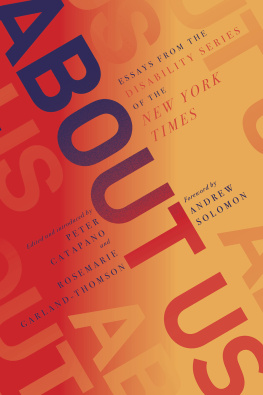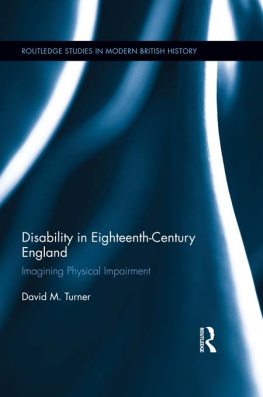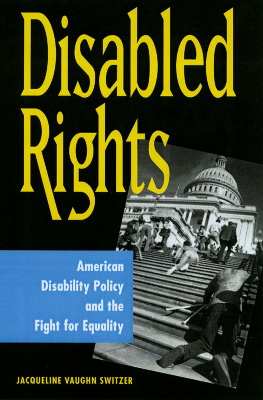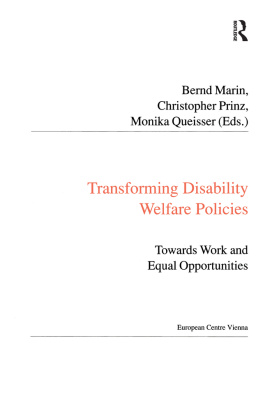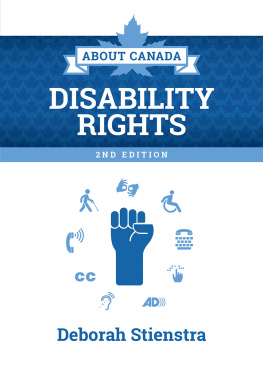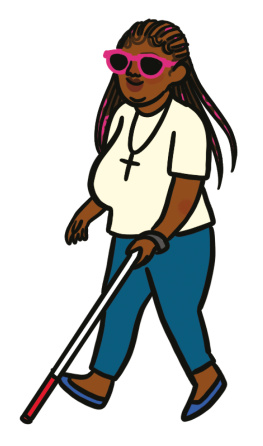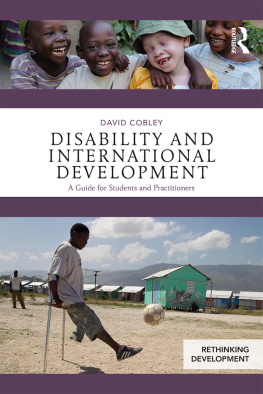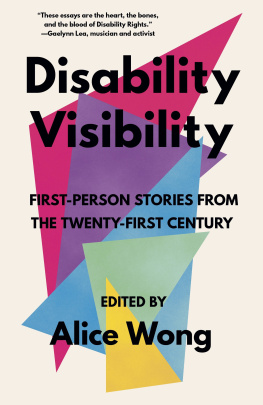Contents
Page list
Guide

ABOUT
US
ESSAYS FROM THE DISABILITY SERIES
OF THE NEW YORK TIMES
EDITED AND INTRODUCED BY
PETER CATAPANO AND ROSEMARIE GARLAND-THOMSON
FOREWORD BY
ANDREW SOLOMON

LIVERIGHT PUBLISHING CORPORATION
A Division of W. W. Norton & Company
Independent Publishers Since 1923
Copyright 2019 by The New York Times Company
Foreword copyright 2019 by Andrew Solomon
Preface by Peter Catapano
Introduction by Rosemarie Garland-Thomson
All rights reserved
First Edition
For information about permission to reproduce selections from this book, write to
Permissions, Liveright Publishing Corporation, a division of W. W. Norton & Company, Inc.,
500 Fifth Avenue, New York, NY 10110
For information about special discounts for bulk purchases, please contact
W. W. Norton Special Sales at specialsales@wwnorton.com or 800-233-4830
Book design by Chris Welch
Production manager: Lauren Abbate
Library of Congress Cataloging-in-Publication Data is available
ISBN 978-1-63149-585-4
ISBN 978-1-63149-586-1 (ebook)
Liveright Publishing Corporation, 500 Fifth Avenue, New York, N.Y. 10110
www.wwnorton.com
W. W. Norton & Company Ltd., 15 Carlisle Street, London W1D 3BS
CONTENTS
The eugenics movement spearheaded by Francis Galton in England in the late Victorian period reached a culmination in the view that if you got rid of the misfits, you could breed a pure, advantaged race. The reach of the movement was reflected in the American campaigns to sterilize disabled people, supported in a 1927 Supreme Court decision in which Oliver Wendell Holmes wrote, It is better for all the world, if instead of waiting to execute degenerate offspring for crime, or to let them starve for their imbecility, society can prevent those who are manifestly unfit from continuing their kind. Three generations of imbeciles are enough. Drawing on these sources, Hitler began his campaigns of genocide by gassing the disabled, presuming not only that they were polluting the larger population, but also that they were a group no one would miss. Genetic determinism presumed that the weak and disadvantaged passed along their weakness and disadvantage, and that a systematic campaign of eliminating all but the best and strongest could improve the lot of humanity.
There are two entwined arguments here, one about who makes disabled children, and the other about the worth of the lives of those disabled children. What sort of parents have children with disabilities? Every sort of parent. Nondisabled parents produce disabled children with startling regularityand disabled people produce nondisabled children time and again. So that part of the argument is specious, at least when applied so specifically as Galton, Holmes and Hitler contemplated. More relevant to this collection is the modern argument that whether disability is passed along generationally or not, it has inherent worth, and the loss of it from our society would be a troubling depletion of human diversity. That is a more radical, philosophical challenge. Disabled lives are lives, and are charged with inherent dignity. Most people with disabilities dont wish they had never been born; most people with disabilities contribute to the world they inhabit; most people with disabilities both give more to and get more from life than their nondisabled peers may be inclined to guess. Some have rich lives despite their disability, but others would say they have rich lives at least in part because of their disability. Those arguments and the lives to which they pertain are the topic of this collection.
In 1968, the ethicist Joseph Fletcher wrote in The Atlantic Monthly, that esteemed journal of liberal thought, that there was no reason to feel guilty about putting a Down syndrome baby away, whether its put away in the sense of hidden in a sanatorium or in a more responsible lethal sense. It is sad, yes. Dreadful. But it carries no guilt. True guilt arises only from an offense against a person, and a Downs is not a person. A lot of ink has been spilled covering our societys gradual embrace of womens rights, then racial rights, and most recently, gay rights. The shift in attitudes toward disability has been nearly as powerful, if less complete, but it has been much quieter. Today, no one would publish an article in the mainstream media that championed dehumanizing a group of disabled people as Joseph Fletcher did. What was once par for the course has become unthinkable.
Though utilitarian philosophers such as Peter Singer have proposed that parents should have the right to murder their disabled newborns, these views are deliberately polemical, widely protested and abhorrent to most people who encounter them. We have learned to value most people, and with that social advancement has come progress in improving their lives. Acceptance is protection. People with Down syndrome live nearly twice as long as they did in 1968, and many hold down jobs; some are writers or actors or models; some live at least semi-independently. That progress reflects an opening up of a society that no longer experiences the birth of a disabled child as an unmitigated tragedy, that no longer assigns chronic sorrow to the parents. This more accepting and celebratory point of view has some ascendency in the United States, but is a work in progress both here and globally; what constitutes an identity in one society or family may be a disability in another. The sociologist Ashton Applewhite quoted a matador who said, The bull looks different when youre inside the ring. Disability is very different for disabled people than it looks to nondisabled people. What we wouldnt have opted into is not the same as what wed now like to change.
Its hard to remember how strong the arguments were that women were lesser than men, that black people were lesser than white people, that gayness was a crime, a sin and a disease in search of a cure. It can be hard to recollect how many people still make these arguments, how many hated being under the thumb of an African-American president and how many abhor the idea of a female president, how many would deny basic services to gay and trans people, how many regard the disabled with polite disdain. Our society is rife with glass ceilings, and the disability ceiling has the fewest cracks in it. When I attended the 2018 annual convention of The Arc, the countrys largest and oldest organization for people with intellectual and developmental disabilities, I was struck by how seldom we see in common life what I saw there: the meeting of disabled and nondisabled people as equals.
Increasingly, decisions about what kind of child to have are made prenatally, either through preimplantation genetic diagnosis or through amniocentesis. An image of disability is set at the birth of a newborn child. But predictions about any individual life are always hypothetical and often wrong. In interviewing hundreds of parents of children with disabilities, I found a recurring theme of indignation from parents whose children had achieved much moreor much lessthan doctors had anticipated. A baby, disabled or not, is a cypher, and only time will show how and what he or she will do. Doctors who deliver prognostications are usually representing averages. On average, certain conditions bestow certain degrees of disability, but brains and bodies are highly adaptive, and the skills of an individual child can surprise everyone. It is a tough call for doctors. Creating an atmosphere of false hope can be catastrophic; it sets families up for renewed despair with every milestone their child misses. But presuming the worst often results in the worst results; low expectations can be a self-fulfilling prophecy. A tempered realism about the vagaries and uncertainties often obtains the best result, but parents crave assurances and doctors too often indulge that inclination.

